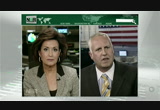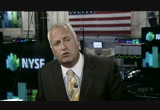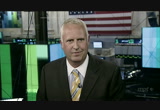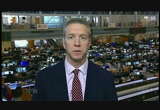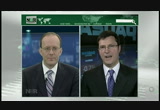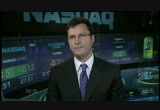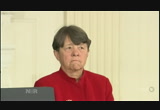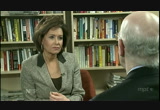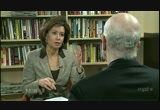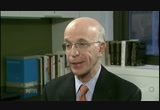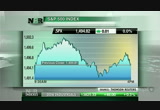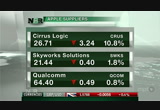tv CBS Evening News With Scott Pelley CBS January 24, 2013 7:00pm-7:30pm EST
7:00 pm
captioning sponsored by wpbt >> this is n.b.r. >> susie: good evening everyone. i'm susie gharib. from windows 8 to the surface tablet, a lot was riding on microsoft's latest earnings, the software giant delivers, but just barely. >> tom: i'm tom hudson. investors take a $63 bite out of apple stock. chomping almost 12% off its price, thanks to the lack of blockbuster financial results. >> susie: and the former vice chairman of the federal reserve, talks with us about the debt crisis, the economy and the fed. alan blinder joins us. >> tom: that and more tonight on "n.b.r."! >> susie: just a single cent higher. earnings from software "giant" microsoft were only a penny more than what analysts were expecting. microsoft shares slipped as much as 2% on the news in after hours trading.
7:01 pm
here are the numbers: microsoft earned $0.76 a share, down 3.7% from a year ago. revenues rose more than 2.5% to $21.5 billion, but also below expectations. the results mark the first quarter to include sales of microsoft's new windows 8 operating system, and its tablet computer, the "surface". sales of its windows division jumped 24%, but no financial details on the surface tablet. we'll have more analysis on microsoft, in a just a moment. >> tom: the other big tech story today: apple and its big fall following yesterday's lackluster results. the stock lost 12% of its value or $63 a share, closing at $450 and change. suzanne pratt reports. >> reporter: no doubt this was a sour day for investors. not only did the stock log its largest dollar drop ever, but the shares are now trading at their lowest level in a year. today's selling was so intense
7:02 pm
it tripped circuit breakers at the nasdaq and, don't forget it was just september when the stock topped $700 as investors salivated over the iphone 5. it tool less than five months for momentum to shift, and the stock to go from market darling to disappointment. yesterday's results really weren't that bad. but wall street analysts did not like what they saw in the numbers. to that end, many firms cut their price target for apple today, including jefferies which slashed its target by $200 a share. jefferies also downgraded the shares to a hold from a buy, saying "we think apple is losing the screen-size wars," noting demand is moving away from the iphone 5 to competitors with five-inch screens like samsung. because apple shares are so widely held, many investors tonight are wondering what to do with them. perhaps apple is no longer considered a growth stock. but, is it already low enough to
7:03 pm
be considered a value play? suzanne pratt, "n.b.r.," new york. >> susie: joining us now with more analysis on apple, and those microsoft earnings, collin gillis, technology analyst at b.g.c. partners. thely for apple their growth is slowing down. it is not the type of growth that wall street labels growth stock. when you see that market sell-off today it has put apple evaluation clearly into the value territory. >> susie: all right but let's just say that apple comes out with a bunch of really cool new products maybe that ame tv we keep hearing about. would that make apple a growth stock again? >> you know and so there's always that potential. you know what investors need to see is what is the innovation that's going to be coming out of apple in the future. and that level of innovation
7:04 pm
isn't is in question right now. we haven't seen any new dynamic products that have introduced new revenue streams. it's all been about the iphone and ipad. >> susie: so let's talk about the stock. big sell-off today as we reported. you have a hold on apple. you dropped your target today from 575 a share to 550. but does apple go lower from here? >> you know we look like it's got a baselinement and if you think about apple evaluation, again we talk about it being a value stock now. it trades seven times earnings when you back out that cash. and that cash is about a third of apple's total valuation. we're talking about 137 billion dollars. and part of the thesis for people who would want to own apple is going to be dividends, right. and apple pays a small dividend now. it yields about 2.3%. they need to return that cash back to shareholders. and really, boost up that dividend-- dividend yield.
7:05 pm
>> susie: would that boost the stock so they give a special dividend to shareholders is that just a band-aid on a more fundamental problem? >> apple say victim of its own success. but the amount of cash that they continue to generate every single quarter say wonderful thing. and if you dividend that out consistently, every quarter as opposed to a special dividend, that's something that a certain class of investors would like to own. >> susie: let's talk a little bit about microsoft and those earnings. you were on the conference call with the company management. this is a make-or-break year for microsoft. how is this doing? >> you know so absolutely they have rolled out a lot of very radical new products. windows 8 in particular. it's their flagship product and they brought a whole new approach to it and the results that came this quarter on a very difficult macro backdrop were right in line. were pleasing. in fact the windows division grew at 24% against a pc market that declined by 6%. we like what microsoft is doing. we like the software that they're making.
7:06 pm
it's good product. they have multiple revenue streams. the stock trades at 10 times and it's going to grow faster than apple in the march quarter. >> susie: you have a buy on the stock, so what will really drive it higher s it just slowly these window products, the tablets anything else? >> you know, also the surface tablet that they sell. you know we tell investors that microsoft needs to only sell a very small number of these for it to become meaningful if they can sell just a million a quarter that has a nice impact to their revenue line. unlike apple which needs to sell millions and millions and millions of each unit every quarter. >> susie: all right. we have to leave it there. colin, any disclosures to make about apple or microsoft sm. >> we don't phone the stock and we have done no investment banking. >> susie: thanks for coming on colin gillis technology analyst. >> reporter: still ahead, wall street gets a new top cop, we look at mary jo white, the president's nominee to lead the
7:07 pm
securities and exchange commission. >> tom: while tech stocks stumbled today, the blue chips and the broader market managed to end another session at five year highs. the dow rose 46 points, the nasdaq lost 23 but the s&p gained the slightest of fractions to another new high. >> tom: helping stocks was some encouraging news on the jobs front: the number of people filing for unemployment benefits for the first time fell last week to a level we haven't seen since 2008. 330,000 people filed new claims for unemployment insurance, that was far lower than expectations. could this be another sign that the jobs picture is continuing to improve? ruben ramirez reports. >> reporter: much like the weather in january, taking a reading of the jobs picture tends to be a bit of a challenge in the first month of the year. the week to week numbers can be volatile as companies let go of temporary employees hired for the holiday season.
7:08 pm
but, the monthly average trend is also improving. >> this jobless claims numbers are registering a stronger jobs market at a time where we are not really seeing other signs of the economy reinforce it. i'd like to see some reinforcing signals and we're not, but for the time being two weeks of numbers this low are very tantalizing. >> reporter: jobless claims are now at roughly the same level they were in early 2008. also, don't forget that up until this week's cold-weather snap, temperatures were unseasonably warm, letting builders continue projects in what would typically be snowy weather. >> temperatures have been above normal and typically when you do have above normal temperatures economic activity and in particular jobless claims do show some bias for exaggerated improvement that perhaps we may not get the layoffs that are typical around this year in particular in the construction industry. >> reporter: construction is expected to continue to be strong, estimates have the industry adding as many as
7:09 pm
140,000 jobs this year, that's up from a meager 18,000 in 2012. but construction is just one sector, and, much like the weather in january, the jobs picture could go from hot to cold just as easily. ruben ramirez, "n.b.r.," new york. if hiring is to pick up private companies will be the ones creating most of those new jobs. in a new survey out finds those firms plan on adding workers in the year ahead. 56% of privately held companies say they will be adding to their payrolls over the next year. that is according to a survey by business service its firm price waterhouse coopers. ken ash is a partner at pwc. he joins us tonight from the naz. ken how robust are these private companies planning on hiring lots of new jobs or just filling in here and there? >> well they are definitely hiring additional workers and we're very happy to hear that. you know t is a substantial increase over the last year or so that we have been
7:10 pm
keeping the data in this report. but we are talking about an average head count increase of about 2.8%. and that's up from 1.6 in prior periods. >> tom: all right so pretty good there. it sounds like we may see some of those numbers turn out in those monthly unemployment figures. what about the types of injuries that are expected to add to the head count. >> well we see it across industries in the pwc survey. we do look at manufacturing. we look at product type of firms. we look at services, firms. and all of them are expecting to increase that hiring. we think that's good news. >> tom: manufacturing is interesting because that of course was really hit hard during the great recession. really hasn't bounced back all that much as of late. what is fueling the confidence to add to manufacturing job os? >> well, i think one of the things that we're looking at is a change in the cost structure of manufacturing abroad. and it comes in two forms. the first is perhaps wage inflation, in some of those low-cost manufacturing jurisdictions like a china. and then you layer on top
7:11 pm
some additional costs associated with shipping and all of a sudden it becomes more appealing to manufacture here in the u.s. if you are serving a u.s.-based customer. >> tom: also's talk about private company growth because your survey asked those private firms expecting pretty significant business growth this year especially when considered to the overall gdp expectations. the u.s. competent commented to only grow by 1.8%. private companies say they will grow by 7%. how? >> well, we think that part of it is perhaps growing off a smaller base. and working in being a little bit more nimble. and in line with your customer expectations. it's a little bit easier to refine your product and your services in a smaller private company than a larger one. and i guess i would also point out that in our survey that there is a difference between the growth expectations for domestic only businesses. which may be expect a 5% growth rate where -- some of the international marketing firms particularly those
7:12 pm
growing in the high growth jurisdictions like the brick countries are expecting near 10%. >> almost twice as good but certainly still optimistic of 5% growth rate compared to less than 2% growth rate for the overall economy. we have to leave it there with ken ash with price waterhouse coopers. >> susie: for the first time in its 80-year history, the securities and exchange commission may be headed by a former federal prosecutor. president obama today named mary jo white as his choice for s.e.c. chair. as u.s. attorney in the southern district of new york, white
7:13 pm
helped prosecute mob bosses and terrorists. darren gersh reports. >> reporter: no one on wall street could miss the significance of picking a former federal prosecutor to lead the securities and exchange commission. the president drove the point home saying mary jo white had taken down the head of the gambino crime family, the terorists who bombed the world trade center, and many others. >> i'd say that's a pretty good run. you don't want to mess with mary jo. >> reporter: the s.e.c. has struggled to rebuild it's reputation and stature following the madoff scandal and the financial crisis and white signaled she would be an active reformer. >> the s.e.c., long a vital and positive force for the markets has a lot of hard and important work ahead of it. i would welcome the opportunity to lead those efforts. >> reporter: the president says white isn't easily intimidated, a requirement for the job facing the s.e.c. >> we need to keep going after irresponsible behavior in the financial industry so that taxpayers don't pay the price.
7:14 pm
>> reporter: the president wants to keep another cop on the financial beat. senate republicans blocked a vote on richard cordray's nomination to be the first head of the consumer financial protection bureau. the president appointed him anyway, but that term ends this year and obama wants the senate to act this time. >> financial institutions have plenty of lobbyists looking out for their interests. the american people need richard to keep standing up for them. >> reporter: over the last year, cordray has put to rest many fears the c.f.p.b. would overreach. >> we approach this work with open minds, open ears and great determination. >> reporter: but republicans seem equally determined to block cordray. they want to change the c.f.p.b., replacing a single director with a board of commissioners. darren gersh, "n.b.r.," washington. >> susie: what really happened in the financial crisis, and what work still needs to be done, is the focus of a new book. "after the music stopped" is written by alan blinder, former vice chairman of the federal reserve, and now professor of
7:15 pm
economics at princeton. when i sat down with him today, i asked him if the financial system is still at risk, five years later. >> i think we are still at risk. i tell you what i think is the biggest one it is not in the details but in the very broad frame which is that the bank bailout and the things that went around the bank bailout got such a bad name in a political sense with the public that i fear that if we ever have to do anything like that again we're not going to do it. and it was actually a success even though people think it was a failure. >> susie: you say in your book that there is still a long a againa of unfinished business what. concerns you most? >> a lot of the regulations have not been put in final form and made operational am i will give you a clear example that worries me a lot which is derivatives. there has been from the beginning, the writing of the rules a controversy over how many should be standardized and put on exchanges where they are safe like stocks and bonds. and how many should be otc over-the-counter, customized.
7:16 pm
those were the things that got us into a lot of trouble during the crisis. and i think there is still too much of that. >> as you know, yesterday lawmakers passed this bill to extend the debt limit. it's a temporary fix. to what extent s this dangerous for the economy? >> it's very dangerous. if you bump not national debt ceiling even if as critics say the secretary of the treasury can prioritize payments and make the payments on the national debt, the government's going to be a deadbeat on something. it's bills to contractors its salary obligations something will happen and at least we've got that off the table for a few months. >> washington does this all the time. they have these short-term fixes. how do you feel about thoughs? >> it's better than nothing. what is the alternative, a government shutdown as we may be facing at the end of march. so if they keep doing these short-term fixes, at least we're not having a calamity. the problem, of course, is the longer you delay a lot of these things the harder it gets. >> so put politic as side what is the solution to this budget and debt cries snis.
7:17 pm
>> well you remember bill clinton at the convention said arithmetic. it comes down to arithmetic. we've got this yawning gap between what the government takes in and what it spends. and realistically you've got to pov both ends this is what president obama calls balance and what the republicans call nonsense because it involves raising taxes. i think you have to do bovment i think you have to have more revenue and you have to cut back spending. >> susie: let's say congress doesn't do that. what happens next? explain to people what happens next. >> i think the real risk is that we come to a showdown in march when the current stopgap budget ends and we face the government shutdown. people will lose services. people will lose jobs. and there will be a fiscal contraction on top of the ones that we've already put in place. and that's not great for the economy for sure. >> you know, and this whole conversation about a budget and the deficit and all of that. it's all about raising taxes and cutting spending. and there's no discuss about test test test. to do to get growth?
7:18 pm
>> well the badh6+suz there susie s that while higher growth is by far the best remedy it's very hard to put if into effect. in a sizable way. you need more investment in human beings that's education and so on. you need more investment in physical plant and equipment. and you need to promote technology. >> we're doing all those things, so you know we're not exactly getting a on any of them so it would be nice if we could get a on all of them and then we could do better. but i think it's unrealistic to think that growth is going to do the whole job. >> what about the federal reserve. it has its first meeting this year next week. is there anything more than the fed can do besides keeping interest rates superlow? >> not that much. the fed is more or less restricted to working on interest rates and things that are related closely related to interest rates. i think really if we're going to get a big push to growth it's got to come from the government. and believe it or not, i
7:19 pm
would add have kate another stimulus package. not as big as the of the lamented ones but another one followed of course coupled with deficit reduction. you don't want to let the budget just blow up >> susie: here's the latest on the boeing 787. the investigation into the cause of battery fires on the dreamliner is going to be a long haul. the national transportation safety board said today it's still far from determining a cause. >> so here are findings to date: fire was present.
7:20 pm
there are signs of thermal runaway and of short circuiting. >> susie: "thermal run-away," is when a chemical reaction causes the battery to overheat. tom, the 787 fire in boston was one of two battery-related incidents, that grounded all 50 dreamliners in service. we got a statement, that while progress continues to assess the regulators here in the u.s. and japan, it stays is not permitted to comment directly on the investigation as it is ongoing. shares of boeing responded pretty positively here. they were up by 1.4%. overall the broad market well it has a shadow cast on the market thanks to apple that was specifically for technology the broader market was able to creep higher.
7:21 pm
the s&p 500, which includes apple, climbed over the $1,500 level this morning thanks to the encouraging weekly jobs data. the buying lost some steam in the early afternoon, with the index eeking out a gain of one penny. volume on the big board was on the lighter side at 676 million shares. but nasdaq volume was heavy with over two billion shares trading. the losses were concentrated in the technology sector, losing 2%. while the consumer discretionary sector put in the best performance, up 0.7%. in the tech sector it was all about apple and worries its growth rate is slowing. but those worries are exclusive to apple. they stretched to the stocks of its key suppliers. cirrus logic makes energy and audio semiconductors for apple. shares fell 10.8%. cirrus reported a big jump for its quarterly profits, but revenues were not as strong as wall street estimates. fellow apple supplier sky-works dropped 1.8%. wireless semiconductor supplier qualcomm saw more modest weakness, down just 0.8%. a big apple partner, a.t.&t. experienced the short term cost of selling all those iphones at a discount. but saw the growth slow of wireless new subscribers signing long term contracts.
7:22 pm
while earnings were up from a year ago, they were a penny per share less than estimates. these results are before a.t.&t. took a $10 billion accounting charge for pension and retirement plans. as the company battles verizon for wireless customers, it is falling further behind. a.t.&t. added 780,000 in the fourth quarter to a total of 70.5 million. but verizon added 2.1 million new subscribers in the same time period to 92.5 million. shares of a.t.&t. were down a fraction during the regular trading session, but gained about 0.5% to almost $34 per share in extended hours trading. it's full year forecast was slightly more encouraging than what analysts had expected. also moving in after hours trading was starbucks. the stock finished the regular session up 0.2%, and added another 2% after releasing its latest financial results. the company earned $0.57 per share, up from a year ago and right as expected.
7:23 pm
sales at stores open for at least a year were stronger than forecast, with double digit growth in china and asia. manufacturing conglomerate 3-m also is optimistic about china. the company said demand is improving there, with its four quarter china sales up 10%. total earnings came in as forecast butit satisfied traders and investors. shares rose 0.2% enough to close at a new 52 week high. while apple was the big loser, you have to see netflix. the streaming media company reported a surprise profit last night, and shares took off. the stock shot up more than 42%, closing at their highest price since 2011. three of the five most active traded exchange traded products were higher. the nasdaq one hundred tracking fund saw the heaviest selling, down 1.4%. and that's tonight's "market focus." >> susie: in tonght's "kids &
7:24 pm
>> susie: in tonght's "kids & cash," turning a financial speed bump, into a learning opportunity. here's "earn it, learn it" author alisa weinstein. >> if you've ever started to teach your kid a money lesson, only to have it completely derailed by something you never saw coming, you'll get this. so were at a playdate and he falls in love with his friends criss-cross hot wheels race track-thingy. he has to have it. sure, you can have it. but you're buying it yourself. he agreed. we researched online prices- including shipping-set up a savings schedule, and off he went. now, fast-forward a year. he has the money to buy that toy. but, the pricing gods decide to play a mean little joke. that $33 item is now at $46. nice. so, how do we, as parents, make this work? well, first we curse the pricing gods.
7:25 pm
then, we adjust. and, even more importantly, we tell our kids why were adjusting. money isn't constant or guaranteed. then, we talk about how we could have avoided this pitfall in the first place. cutting coupons, noting sales and, double-checking prices on a regular basis. so if you've ever been blind- sided while trying to teach your kid a money management lesson, know that the surprise lesson may be even better. and that its ok if mom chips in the extra 13 bucks for a race track worth saving for. i'm alisa weinstein. >> susie: and finally, several big firms stuck by their calls on apple today. but new research from our "nbr- u" partners at stanford university, shows how that kind of stubborness can lead to market booms and busts. learn more on: www.nbr.com, just look for the "nbr-u" tab. that's "nightly business report" for thursday, january 24. good night everyone, you too tom.
7:26 pm
7:29 pm
110 Views
IN COLLECTIONS
WJZ (CBS) Television Archive
Television Archive  Television Archive News Search Service
Television Archive News Search Service 
Uploaded by TV Archive on

 Live Music Archive
Live Music Archive Librivox Free Audio
Librivox Free Audio Metropolitan Museum
Metropolitan Museum Cleveland Museum of Art
Cleveland Museum of Art Internet Arcade
Internet Arcade Console Living Room
Console Living Room Books to Borrow
Books to Borrow Open Library
Open Library TV News
TV News Understanding 9/11
Understanding 9/11



